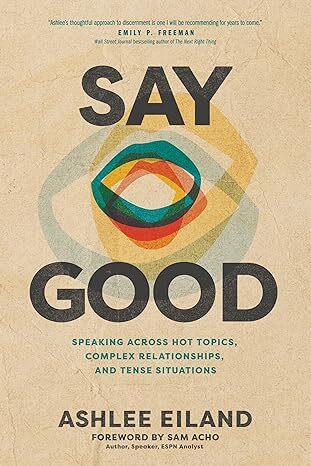How Do You Process All The Pain in the World?
This woman is just pure joy. Her smile lights up a room. And yet. Ashlee is willing to thoughtfully embrace the messy, difficult conversations . . . pain, injustice, division—those tense times when you wonder whether to become invisible or speak up. How does she find the courage and the right words? Her new book, Say Good, helps us all recognize the need for our voice to be heard at the right time. She reminds us of Jesus’ intense love for each one of us. That’s why I’m pouring two big cups of tea as I welcome Ashlee Eiland to the farm’s front porch today . . .
Guest Post by Ashlee Eliand
“Jesus wept... These two words are less fancy fluff and more like faith boulders. They pin my experience of Jesus as fully human and fully God securely beneath the testimony of very human emotions. “
“Jesus wept.” (John 11:35)
My mother used to say this prayer almost every night at our dinner table.
It was just the three of us: my father, myself, and her. But all of us would offer grace before the meal. I’d offer the standard yet classic “God is great, God is good,” my dad would offer more of an off-the-cuff, in-the-Spirit prayer—and my mom would round the grace out with these two simple words. Jesus wept.
Sometimes I thought those two words were kind of a Christian cop-out, a way to more expeditiously get to my daddy’s smothered pork chops and lima beans or my mom’s fried fish and taco salad (yes, a side). But now I understand: These two words are less fancy fluff and more like faith boulders. They pin my experience of Jesus as fully human and fully God securely beneath the testimony of very human emotions.
Jesus, Savior of the world, wept.






Just before this shortest verse in the Bible, Jesus saw his friend Mary weeping.
Her brother, Lazarus, was dead. And when Jesus saw Mary weeping, he was “deeply moved in his spirit.” (John 11:33) Not like you or I would be moved by an old episode of This Is Us, or on the other end of a puppy commercial featuring Sarah McLachlan’s “In the Arms of the Angels,” or at the closing scene of Disney’s Coco. When the text says Jesus was “deeply moved,” it’s likely referring to indignation. This “deeply moved” was more like an inward groaning, a stirring of spirit, a response to his friend’s grief.
“Could it be that whatever moves us to tears, whether injustice or grief or loss or disruption, is enough to move Jesus, too? “
Mary’s tears moved Jesus to tears. Could it be that whatever moves us to tears, whether injustice or grief or loss or disruption, is enough to move Jesus, too?
Jesus weeps one other place in the Gospels. Shortly after he enters Jerusalem, riding on a colt with a multitude praising God, Luke’s account describes Jesus weeping over the city and saying, “Would that you, even you, had known on this day the things that make for peace! But now they are hidden from your eyes.” (Luke 19:42)
While the weeping we encounter in John 11 is reflective of the Greek dakruō, which typically refers to the shedding of tears, the kind of weeping Jesus offers over Jerusalem is described using the Greek term klaiō, which usually refers to a louder expression of grief, such as sobbing or wailing aloud (as explained in Strong’s Greek Dictionary of the New Testament).
Undone, unhindered, Jesus weeps over a city he knows is missing the life he offers: abundant life for every person inside and outside its walls. In just a few days, crowds of people will shout for his crucifixion. His disciple Judas will betray him for money. Another one of his disciples, Peter, will deny knowing him—not one, not two, but three times. A handful of decades later, the city will be destroyed by the Roman military.
“Holy discontent invites us to notice. Injustice invites us to weep.“
Jesus wept, he wailed, over injustices to come—both during his journey to the cross and upon a city he longed to be saved. The hard-heartedness of a people would perpetuate cycles of brokenness. Jesus did not want it to be so.
If holy discontent is at the intersection of your yes and the Good News—if it takes hold of your heart—it might just be what moves you beyond discontent to the vulnerable posture of one who weeps.
Holy discontent invites us to notice. Injustice invites us to weep.
What are you willing to weep over?






Without the aching pain of our wails, a passion created by holy discontent and sustained by experience can petrify our hearts over time.
Without our tears, our hearts have few options but to harden. But when we let ourselves weep, we grow more tender to the point where our whole selves—hearts, hands, bodies, and voices—might join our rage and our grief.
“Weeping is vital to our ability to speak good from a place of wholeness. “
We learn that our weeping, in fact, is not meant to be scolded into the corners of our stories. Weeping is vital to our ability to speak good from a place of wholeness.
If you were taught not to cry, that weeping meant you were weak or less of a person, that piles of crumpled tissues meant they’d never take you seriously—remember that Jesus wept.
His friend’s grief was enough to move him. The gap between his hope and how a people would turn against him was worthy of his groans.
Injustices are more than simply opportunities for cathartic emoting.
They create a chasm and give us a place to go.
They show us where to set up next.
They anchor us to a place, bringing focus and intention.

Ashlee Eiland is a thought leader, writer, and Bible teacher who is deeply committed to advancing God’s redemptive work here on earth. Her work has one purpose: to help humanity build bridges back to the truth of who God is and between one another in whole and healing relationships. Ashlee leads as vice president of partnerships for The Colossian Forum, a non-profit that works to harness the power of disagreement to restore connection. She has served as a coach and cohort leader with Women Speakers Collective and previously served as co-lead pastor at Mars Hill Bible Church in west Michigan. Watch for the forthcoming documentary, Leap of Faith, which features Ashlee and the work of The Colossian Forum on personal transformation and communal reconciliation. Ashlee and her husband live in Grand Rapids with their three kids.
The excerpt that she shares today is from her new book, Say Good: Speaking across Hot Topics, Complex Relationships, and Tense Situations. In Say Good, Ashlee helps you discover the power of stewarding your unique voice. Using a four-part discernment process of passion, accountability, influence, and relationship, you’ll discover the spaces, ways, and times where your words are needed. As you do, you’ll find the conviction and confidence to speak up in even the most flammable challenges.
The world isn’t getting any easier. Say Good is a timeless resource that will help you find your voice and speak with love and confidence into the division, injustice, and pain around you.
{Our humble thanks to NavPress for their partnership in today’s devotional.}
Ann Voskamp's Blog
- Ann Voskamp's profile
- 1368 followers



